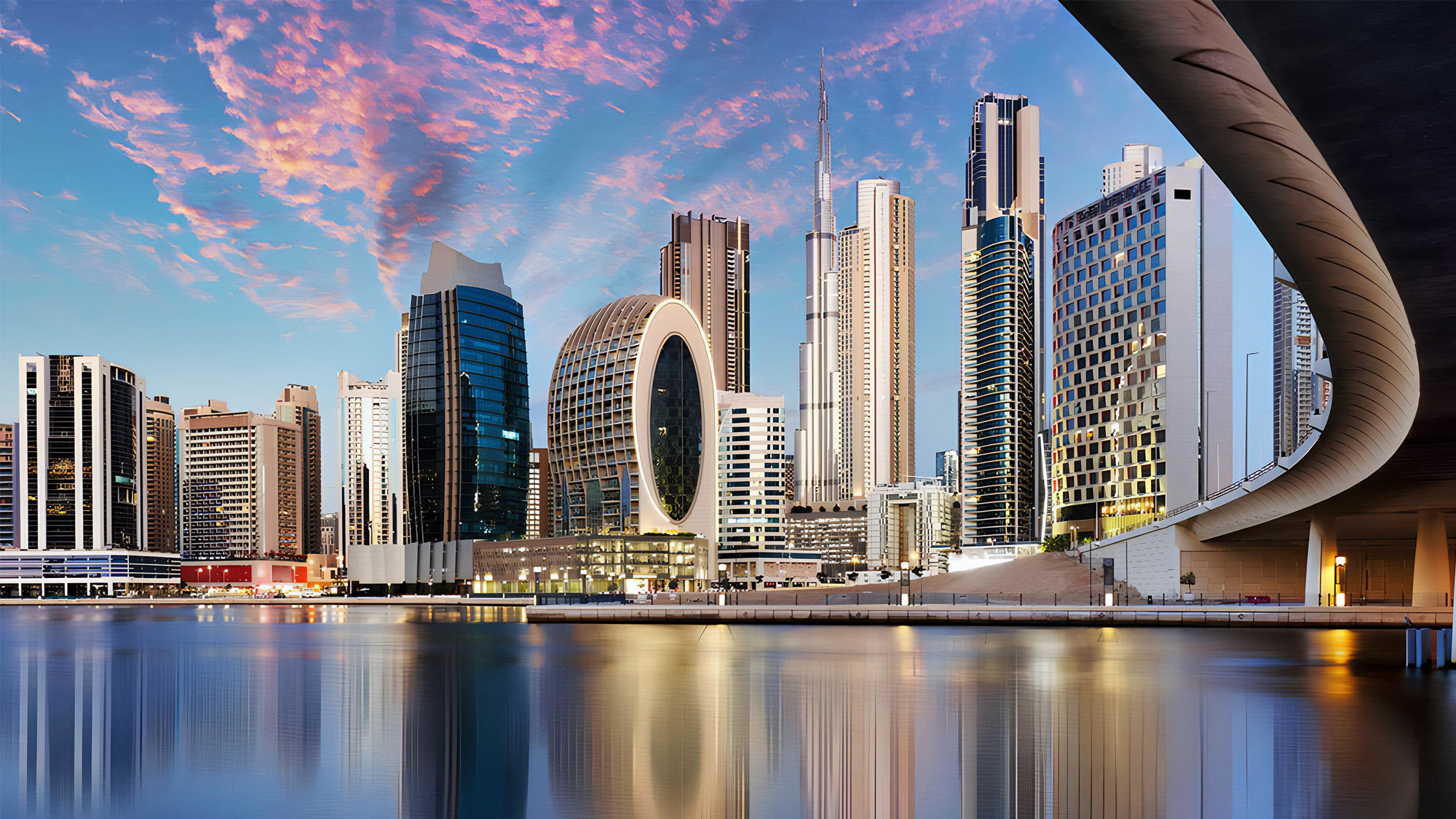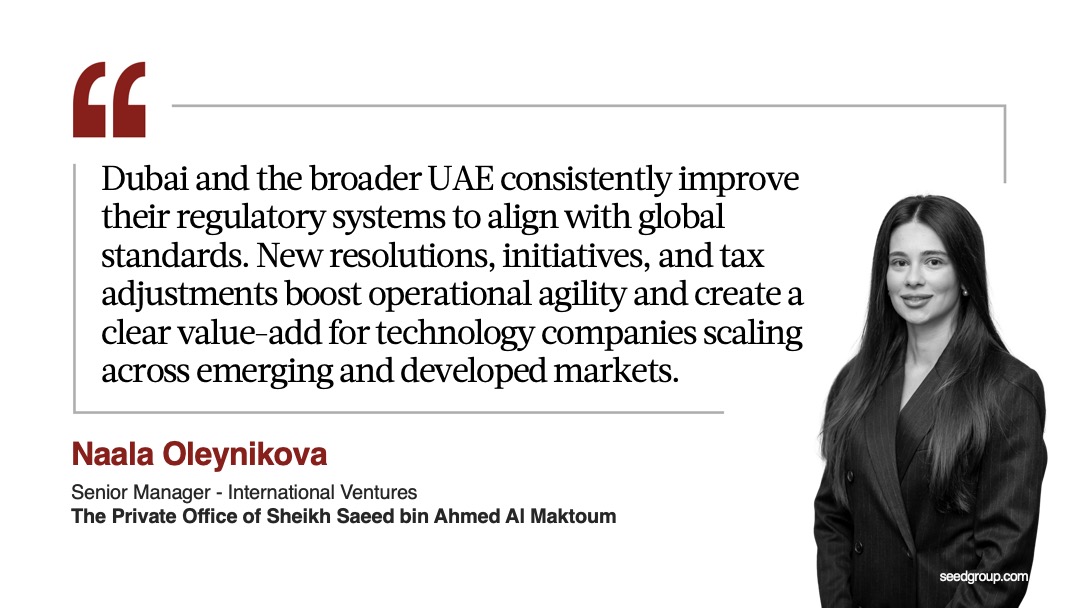



Expert insights by Naala Oleynikova, Senior Manager for International Ventures at The Private Office of Sheikh Saeed bin Ahmed Al Maktoum and Seed Group
In March, Dubai issued a new resolution allowing any company licensed by a free zone authority to operate in the mainland, subject to license acquisition. This regulation aims to boost the ease of doing business and increase commercial activity in the emirate and the wider UAE. Concurrently, the UAE revised its corporate tax framework for large multinational enterprises (MNEs) to align with Organisation for Economic Co-operation and Development (OECD) guidelines.
Similarly, large-scale summits like the AIM Congress are organised to provide an avenue for exhibitions and high-profile global forums. These developments underscore how Dubai, and the larger UAE, have always leaned towards progress — especially when it comes to defining a globally competitive, pro-business environment.
This article outlines the nation’s broader, deliberate regulatory reforms and strategies that help establish an innovation-friendly destination for global SMBs. Please note that this content should not be interpreted as legal advice. Businesses should consult a professional for specific concerns and to create tailored strategies.
H.H. Sheikh Hamdan bin Mohammed bin Rashid Al Maktoum, Dubai Crown Prince, Deputy Prime Minister and Minister of Defence, and Chairman of The Executive Council of Dubai, issued in March the Executive Council Resolution No. (11) of 2025.
The resolution allows any company licensed by a free zone authority to operate in mainland Dubai, except for financial institutions licensed in DIFC. It’s worth noting that businesses must first get the necessary approvals from Dubai’s Department of Economy and Tourism.
This move has major implications for entrepreneurs specifically looking to set up their businesses in Dubai. It undeniably helps free zone companies connect their operations across the emirate more easily, reduce compliance processes, and broaden access to local markets.
Here are the key compliance rules under the Resolution:
The DET will release a list of approved economic activities eligible under this system in the coming months, further easing the process for businesses that have started or are starting in Dubai.
As the Senior Manager for International Ventures at The Private Office of Sheikh Saeed bin Ahmed Al Maktoum, I’ve seen firsthand how the UAE business environment continues to exceed expectations.
Entrepreneurs — especially those starting a business in Dubai and the larger UAE — currently benefit from a globally connected, strategically designed ecosystem. Cliché as it may sound, this is driven by deliberate policy choices, advanced infrastructure, full foreign ownership options, and 0% corporate tax in select free zones.
Staying true to this forward-looking approach, the UAE has again displayed its commitment to aligning with international standards when it implemented a 15% Domestic Minimum Top-up Tax (DMTT) on 1 January 2025. The top-up tax ensures that large multinational enterprises with over €750 million (approximately AED 3 billion) annual global revenues contribute a minimum level of taxation.
This move meets the two-pillar solution of the OECD to ensure a fair and transparent global tax structure. It also follows the UAE’s broader corporate tax changes, which include a 9% rate that began on 1 June 2023 for companies with annual profits over AED 375,000. Notably, the tax remains considerably lower than in many other economies.
The DMTT is part of the UAE’s ongoing efforts to meet international tax standards while ensuring a competitive and innovation-driven economy for start-ups and SMBs alike.
In April of this year, I had the privilege of attending the 14th edition of the AIM Congress at the Abu Dhabi National Exhibition Centre under the patronage of the UAE Ministry of Economy.
The summit brought together over 20,000 global delegates, made up of innovators, investors, regulators, and government entities. AIM Congress rendered the platform for promoting the clarity and coordination needed to scale groundbreaking, albeit regulated, innovations on a global level.
During the event, I had the honour of moderating the Fireside Chat, ‘The UAE Regulatory Framework — Towards Promoting the Growth of SMEs’, alongside Ahmed AlRaeesi of the Emirates Entrepreneurship Association and Anas Zeineddine from innovaMENA. We talked about how targeted policies, simplified licensing procedures, and strong state support have enhanced the UAE’s reputation as a launchpad for SMBs aiming for efficient growth.
Moreover, I discussed AI and cybersecurity projects with Dr. Nader Ghazal, highlighting the UAE’s fast-growing innovation sectors and their need for agile regulation. I also exchanged insights with global leaders like Matthew Stephenson and Khalid Alaamer from the World Economic Forum on how the country’s regulatory system is keeping up with global economic changes.
With over 12,000 business-to-business and government-to-business as well as 47 memoranda of understanding signed, AIM 2025 showed what strategic investment facilitation looks like. It offers a clear picture of the UAE’s firm vision of improving its corporate ecosystem.

Truly, the UAE’s ability to drive international interest and investment stems from its deliberate and data-led reforms. This is also clearly visible in Dubai, where national policies are translated into agile local initiatives with tangible results.
A key example is the Dubai Economic Agenda (D33), which lays out 100 strategic initiatives focused on investment, innovation, and diversification. Its core aims are to double Dubai’s economy and position it among the top three global cities by 2033.
In terms of nurturing a knowledge-based economy, NextGenFDI is a perfect example. Launched by the UAE Ministry of Economy in July 2022, it seeks to attract technology companies globally by providing streamlined processes (e.g., fast licensing, visa processing, banking services, and leasing incentives) for market entry.
These frameworks have significantly sped up technological progress and improved the overall ease of doing business in Dubai and the broader UAE.
Focusing back on Dubai, the city is renowned for consistently elevating the standards of business services and regulatory transparency. Recent data underscores this advancement, particularly with increasing trade volumes and the smooth execution of cross-border operations.
According to the Dubai Chamber of Commerce, over 204,000 Certificates of Origin and 1,656 ATA Carnets worth nearly AED 984 million were processed in Q1 2025 alone. It also reviewed 10 new laws and draft regulations, adopting 55% of private-sector recommendations. This is a clear sign of an increasingly responsive legal environment.
In addition, the Chamber resolved 45 mediation cases and held 10 legal awareness events attended by hundreds of executives, reinforcing support for compliance and dispute resolution across sectors.
The UAE — especially Dubai — is deliberately shaping a business environment that reduces red tape and accelerates market entry for global entrepreneurs. Through targeted reforms, strategic initiatives, and globally aligned tax policies, the country is eliminating many of the bureaucratic and operational barriers that slow down the process of starting and scaling their businesses in Dubai and the larger UAE.
What this means for entrepreneurs is simple: entering and expanding within the UAE market no longer comes with the legacy hurdles. Instead, SMBs gain access to a well-regulated economy backed by agile governance and global alignment.
Don’t forget to share this post!
We use cookies to enhance your experience on our website. If you continue using this website, we assume that you agree with these. Learn more.


